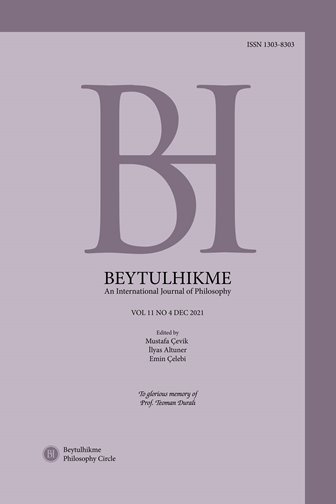Author :
Abstract
Aristoteles ve Kant, zaman kavramına olan ilgilerini zamanın “ben” ile olan ilişkisinde açık ederler. Buna göre Aristoteles’te bir benlik ileri sürülerek zaman kavramı bu benliğe iliştirilir; ancak, aynı zamanda, bu benlik doğrudan doğruya kendisinin oluşumunda zamanın zorunlu olarak içerildiği bir benliktir. Dolayısıyla zamanın benliğe ruh yoluyla iliştirilmiş olması olumsal bir durumu ifade etmez, aksine bir zorunluluğa göndermede bulunur. Diğer yandan, Kant’ta ise zaman kavramının hem doğrudan doğruya “ben”in veya egonun kurucusu olduğu hem de onun varlığıyla birebir örtüşen bir yanının bulunduğu görülür. Bu bakımdan zaman, özne için zorunlu olmakla beraber, öznenin varlığına muhtaç bir kavramı ifade eder. Bu çalışmada, Aristoteles’te temellenen ve “ben”e iliştirilen zamanın Kant’taki dönüşümüne değinilecek ve daha sonra doğrudan doğruya bu hattın ego ile zamanın başa baş giden kavram ikizleri olduğuna yönelik vurgusu açık edilecektir. Son kısımda ise zaman ve benliğin birbirini devam ettiren ve birbiriyle doğrudan bir temas içinde olan kavramlar oldukları ifade edilecektir. Bu bakımdan, zaman benlik aracılığıyla devamlılık halinde bulunurken benlik de zaman yoluyla kendinin bütününü kendi olarak idrak edecek öz-bilinci geliştirir.
Keywords
Abstract
Aristotle and Kant reveal their interests in the concept of time within the relationship of time with “ego”. According to this, in Aristotle’s thought, an ego is asserted, and the concept of time is attached to it; however, at the same time, this ego becomes itself whose constitution necessarily includes the time in the process of its constitution. Therefore, attachment of the time to the ego by means of the soul does not assert contingency. On the contrary, it refers to necessity. On the other hand, the concept of time in Kant’s thought seems both to directly be constitutive for the ego or the “I” and to have a part which, to a great extent, overlaps with the ego. In this sense, besides time’s being necessary for the subject, the former is, at the same time, in need of the latter. In this article, the concept of time, which is grounded and attached to “ego” by Aristotle, and its transformation in Kant’s thought will be explicated. Then, the emphasis of this thought line, generated by Aristotle and Kant, on the subsistence of the time and ego side by side will be unveiled. In the end, after revealing the relatedness of these concepts in the thoughts of these thinkers, the time and ego will be posited as they sustain one another and are directly contiguous to each other. In this context, whilst the time, through the ego, becomes continuous, the ego, by means of the time, becomes able to develop its self-consciousness to concomitantly comprehend its totality as itself.
Keywords
- Albayrak, Ö. B. (2017). Empty Time and Fulfilled Time: Kant and Hegel on His- tory. Hegel-Jahrbuch, 1, 457-461.
- Aristoteles (1996). Fizik. Zaman Kavramı. (Çev. & Der. S. Babür). Ankara: İmge Kitabevi, 8-41.
- Aristoteles (2001). Fizik. (Çev. S. Babür). İstanbul: Yapı Kredi Yayınları.
- Aristoteles (2008). Physics, (Çev. R. Waterfield). New York: Oxford University Press.
- Aristoteles (2014). Kategoriler, (Çev. S. Babür). Ankara: İmge Kitabevi.
- Aristoteles (2018). Metafizik, (Çev. Y. G. Sev). İstanbul: Pinhan Yayıncılık.
- Freud, S. (2012). Narsizm Üzerine ve Schreber Vakası, (Çev. B. Büyükkal & S. M. Tura). İstanbul: Metis Yayınları. ve ancak her şeye hükmeden id bulunur. Benliğin gelişmesi ancak “dışarıdan dayatılan bir ben idealine doğru” yer değiştirme ile gerçekleşir (Freud, 2012, s. 44). “Dışarıdan dayatılan ben ideali” ise zamanı işin içine katmak demektir.
- Freud, S. (2016). Haz İlkesinin Ötesinde – Ben ve İd, (Çev. A. Babaoğlu). İstanbul: Me- tis Yayınları.
- Günenç, M. (2016). Kant’ta Apperzeption Kavramı. Felsefe Arkivi, 44, 1-11.
- Hesse, H. (2019). Demian: Emil Sinclair’in Gençliğinin Öyküsü. (Çev. K. Şipal). İstan- bul: Can Yayınları.
- Kant, I. (1998). Critique of Pure Reason. (Çev. P. Guyer & A. W. Wood). New York: Cambridge University Press.
- Küçükparmak, A. (2017). Kant’a göre Bilgi ve Metafiziğin İmkânı. İstanbul: İz Yayın- cılık.
- Whitehead, A. N. (2018). Doğa ve Yaşam: 1933 Chicago Dersleri. (Çev. S. Çalcı). İstan- bul: Öteki Yayınevi.
- Zarifoğlu, C. (2012). Bütün Eserleri 1: Şiirler. İstanbul: Beyan Yayınları. Öz: Aristoteles ve Kant, zaman kavramına olan ilgilerini zamanın “ben” ile olan ilişkisinde açık ederler. Buna göre Aristoteles’te bir benlik ileri sürülerek zaman kavramı bu benliğe iliştirilir; ancak, aynı zamanda, bu benlik doğrudan doğruya kendisinin oluşumunda zamanın zorunlu olarak içerildiği bir benliktir. Dolayısıyla zamanın benliğe ruh yoluyla iliştirilmiş olması olumsal bir durumu ifade etmez, aksine bir zorunluluğa göndermede bulunur. Diğer yandan, Kant’ta ise zaman kavramının hem doğrudan doğruya “ben”in veya egonun kurucusu olduğu hem de onun varlığıyla birebir örtüşen bir yanının bulunduğu görülür. Bu bakımdan zaman, özne için zorunlu olmakla beraber, öznenin varlığına muhtaç bir kavramı ifade eder. Bu çalışmada, Aristoteles’te temellenen ve “ben”e iliştirilen zamanın Kant’taki dönüşümüne değinilecek ve daha sonra doğrudan doğruya bu hattın ego ile zamanın başa baş giden kavram ikizleri olduğuna yönelik vurgusu açık edilecektir. Son kısımda ise zaman ve benliğin birbirini devam ettiren ve birbiriyle doğrudan bir temas içinde olan kavramlar oldukları ifade edilecektir. Bu bakımdan, zaman benlik aracılığıyla devamlılık halinde bulunurken benlik de zaman yoluyla kendinin bütününü kendi olarak idrak edecek öz-bilinci geliştirir. Anahtar Kelimeler: Zaman, ego, ben, öz-bilinç, tamalgı.





